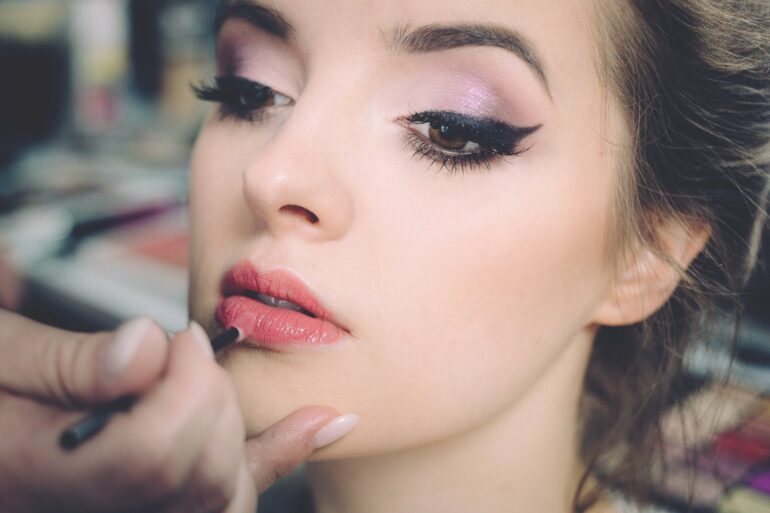A new study has found that digital makeup mirrors enhance a sense of “fakeness” and embarrassment and create a desire for the “real” in-store experience among consumers.
The report, co-authored by Bayes Business School and conducted between 2018-2022, has explored the psychological and sociological factors of the consumer experience when using Augmented Reality (AR) makeup technology; in particular the role that digital makeup mirrors play in enhancing people’s imagination and their perception of self.
The authors find that although individuals may feel comfortable wearing makeup when looking at themselves through a “real” mirror, the opposite is true when looking into a digital makeup mirror.
Consumers found that digital mirrors, promoted by brands including Charlotte Tilbury, L’Oréal and Amazon, enhanced their self-imagination as they were able to imagine themselves looking like their favorite celebrity or how they might have looked in the past. However, when compared with the “real” shopping experience of buying makeup, AR mirrors have created a strong sense of self-inauthenticity. This is because of factors including:
Trying makeup instore brings a sense of enjoyment, whereas looking at ourselves through a digital makeup mirror brings a feeling of “horror”Individuals have a sense of embarrassment when using digital makeup mirrors and feel less likely to want to share digital content in their search for social acceptanceMakeup is an emotional experience; real in-store makeup shopping is perceived as a journey of self-reflection, which is difficult to replicate with a digital makeup mirrorIndividuals view themselves through a lens by which how they “should” look is based on a collective online observation of friends, celebrities or influencers. A digital makeup mirror hinders the way individuals search for this proxy-self.
This feeling of self-inauthenticity initially deflates the consumers’ desire to use online makeup mirrors. However, for consumers to “complete” and “enjoy” their shopping experience, they would rather be physically inside the makeup store. In the meantime, while these apps and devices allow them to send a photo of their transformed self to social media, they fear embarrassment from their social network. So, instead of using an AR makeup mirror to try-on makeup, consumers prefer to find a makeup influencer who shares similarity with their own look, such as skin type or face contour and follow their recommendations.
Users of the digital makeup mirror for the study criticized AR’s lack of understanding or respect for human skin, ethnicity or feelings when applying color on skin, in particular with luxury makeup brands. They also claimed “shameful surprise” with how they looked when using AR makeup mirrors. For instance, although they looked surprised when seeing AR colors on their face, they quickly felt ashamed of their AR look and would barely share their AR photo “privately” with close family and friends, let alone share it publicly online.
One participant said, “… It’s my face. I want it. I want to feel it. I want to try it [real makeup products] on. I want to see the consistency… with makeup it’s not something that I can trust any kind of virtual augmented anything for a decision like what I’m putting on my face.”
Khaled El-Shamandi Ahmed, co-author of the study, said managers and creative companies were “a world apart” from consumers in the experience, adding that consumers must be involved as co-creators if progress is to be made.
However, he added that online AR makeup apps could drive consumers’ footfalls to visit makeup stores ahead of Black Friday on 25 November—with the most recent retail footfall figures showing a 14 percent decline over the pre-COVID comparative period in 2019—and enjoy “real” makeup shopping experience.
Ahmed noted, “Digital makeup mirrors do not extend the self, but to the contrary, create a sense of inauthentic self that can result in embarrassment and shame. This is despite the research which promises that AR will transform consumers’ shopping experience. Those surveyed described finding the right makeup as an ’emotional process’ and ‘a journey.’ This study makes clear that technology, while a powerful and progressive tool in the service sector, can also be a negative and disruptive influence for the consumer.
“Technology companies and consumers are a world apart in terms of the expected and perceived digital service experience, and customer experience managers have a responsibility to balance the fun-factor with reality,” Ahmed concluded.
The study will be published in the Journal of Service Management.
More information:
Khaled El-Shamandi Ahmed et al, Augmented reality magic mirror in the service sector: experiential consumption and the self, Journal of Service Management (2022), DOI: 10.1108/JOSM-12-2021-0484. www.researchgate.net/publication/359743909
Provided by
City University London
Citation:
AI-powered makeup mirrors are driving consumers back to stores to avoid sense of ‘fakeness,’ new study finds (2022, November 23)



